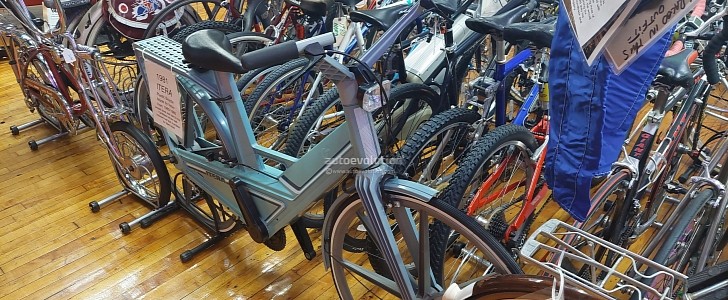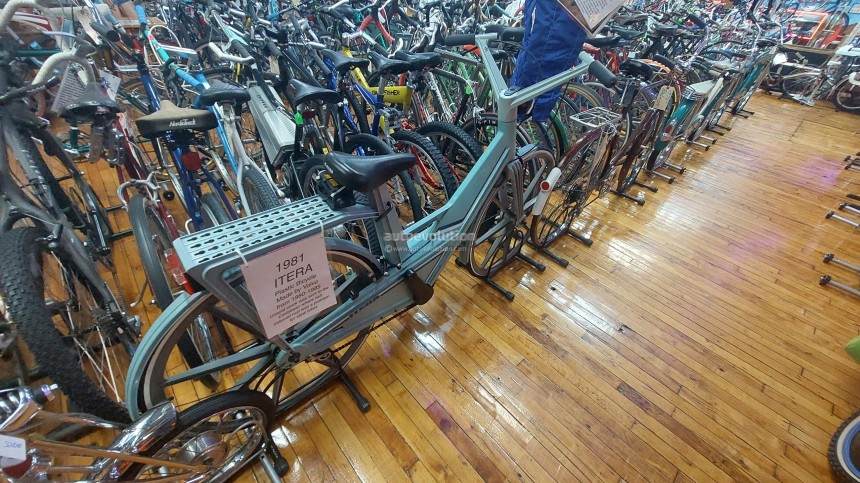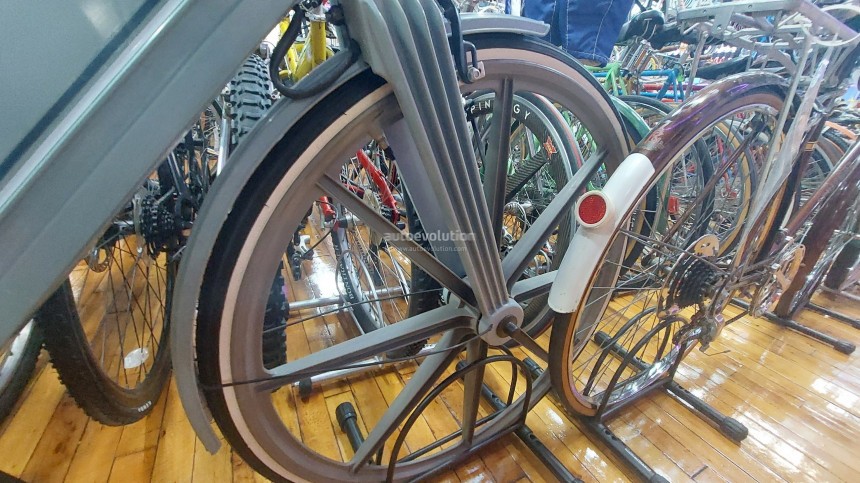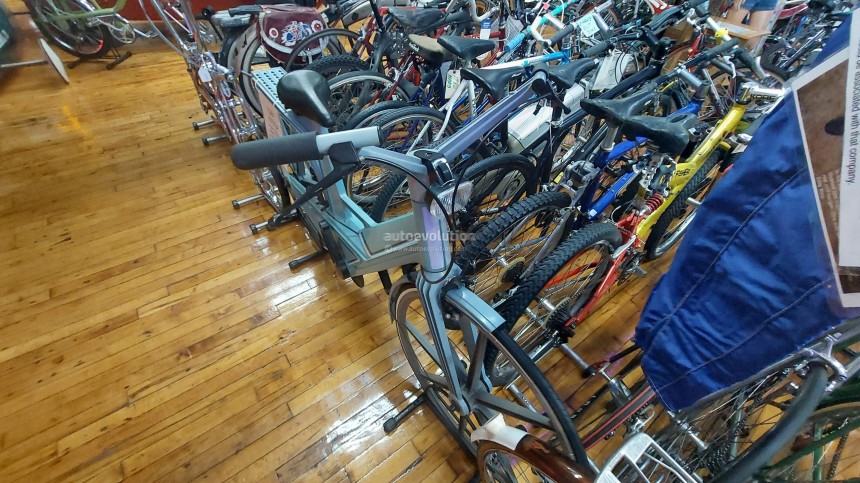Excess weight is the enemy of bicycle riders as much as it is for sports car drivers. It spoils handling, makes you slower, and ensures anyone with a vehicle lighter than yours will have the edge in tight corners. That said, saving weight was the impetus behind a little-remembered project from Volvo to build a new breed of bicycles.
Today, Itera bicycles would probably be a name lost to history, at least in the United States. Had it not been for the efforts of Craig Morrow, the owner, and curator of Pittsburgh's Bicycle Heaven, the largest privately-owned bicycle museum in the world. Chances are pretty good that most Americans would have never known these rare bikes ever existed if not for him. But boy, are we glad he managed to save one because it has a story behind it you'd have never imagined.
Said story begins in Gothenburg, Sweden, in the late 1970s, at Volo HQ. The Cold War was as cold as ever, ABBA was topping the charts, and the Saab J-35 Drakken was still the country's front line fighter, practically begging Soviet MiGs to "come at me, bro." The point is that this period was an absolutely transformative time in Swedish history. A point that was doubly the case for its auto industry.
Saab-Scania and Volvo spent the post World War II years dominating the Nordic Domestic Market, i.e., Sweden, Finland, Norway, Denmark, Greenland, and Iceland, among a few others. By the beginning of the 70s, these two powerhouses accounted for as much as half or more of all passenger vehicles and trucks in Nordic countries, with strong fanbases in both Great Britain and the United States.
Volvo especially had a storied history of developing novel and interesting materials for use in motor vehicle production. Many of them being composite plastics. Even today, Volvo sources leaf springs honed from composite polyurethane plastic for use in the XC-90 as late as 2019. By 1974, it was clear the first global oil crisis was a sign that times needed to change.
Volvo's plan was to adopt a two-pronged approach. One that consisted of both developing more fuel-efficient engines but also better, more lightweight automotive materials. If you think the modern Citroen Ami microcar was some contemporary phenomenon, the Swedes had a very similar idea over four decades ago. The plan was simple, use a limited production run of composite plastic-framed bicycles, then use the same technology in the bodywork in some form of economical microcar later on.
There are more than a few chemical compositions that commercial plastic manufacturers have at their disposal. But Volvo engineers opted for a polyurethane-based composite polymer for a line of bicycles soon to be christened under the name Itera Development Center AB. Nearly 50 years before Polestar became Volvo's second brand, that title was very briefly given to Itera instead. It was a pretty nifty design by most accounts; one can't help but identify the immediate aura of strangeness about the Itera's looks and dimensions.
Where thin wire wheels most often sit were thick spokes made of the same polyurethane composite material as the rest of the bicycle. The bikes were forged from a manufacturing technique referred to as injection molding. Wherein a heat-resistant mold is injected directly with a scalding hot solution of molten plastic, in this case, polyurethane, to create a rust-resistant and relatively easy to manufacture bicycle frame.
This process is universally used today in children's toys, computer keyboard keycaps, and even smartphone components. Apart from the sprocket and chain or perhaps the pedals, everything that constitutes this bike is made of this space-age material the forefathers of bicycle manufacturing could have only dreamed of. It must be said, it was quite a clever idea.
It was an idea so promising that the Swedish government even tossed Volvo a few thousand Krona to organize a national marketing campaign. By 1981, Itera plastic road bikes were being marketed right alongside classic Volvo models like the 240. By year's end, national surveys in Sweden indicated as many as 100,000 Swedes were interested in a nearly rust-proof bicycle with a bare minimum of metal parts in its construction.
Full-scale production began in February 1982 in the town of Vilhelmina, in Northern Sweden. Bewilderingly, Itera bikes were often shipped without all of the components present to 100-percent complete the bike, infuriating customers. Worse still, it's safe to say plastic injection manufacturing has gotten a heck of a lot easier since the early 1980s. Polymer components on the Itera often became cracked and brittle.
Because the Itera had hardly a single nut or bolt compatible with any other bike in existence, one by one, Swedish consumers flocked to Volvo dealerships nationwide to turn in the poly-plastic bicycles they'd only recently forked over money for. The problem was so bad that museum staff at Bicycle Heaven said the unsold stock was shipped to the Caribbean. In hopes that the locals would be more perceptive to the plastic bicycle idea thanks to exceedingly salty island climates.
That idea never panned out either, and today, nor did the microcars the technology was supposed to sire in the first place. The Iterra is little more than a morbid curiosity in the near century-long story of Sweden's largest automaker. Maybe one day, Koenigsegg will be able to take that crown, considering Saab isn't around to stop them.
Check back soon for more from our trip to the world's largest bicycle museum here on autoevolution.
Said story begins in Gothenburg, Sweden, in the late 1970s, at Volo HQ. The Cold War was as cold as ever, ABBA was topping the charts, and the Saab J-35 Drakken was still the country's front line fighter, practically begging Soviet MiGs to "come at me, bro." The point is that this period was an absolutely transformative time in Swedish history. A point that was doubly the case for its auto industry.
Saab-Scania and Volvo spent the post World War II years dominating the Nordic Domestic Market, i.e., Sweden, Finland, Norway, Denmark, Greenland, and Iceland, among a few others. By the beginning of the 70s, these two powerhouses accounted for as much as half or more of all passenger vehicles and trucks in Nordic countries, with strong fanbases in both Great Britain and the United States.
Volvo especially had a storied history of developing novel and interesting materials for use in motor vehicle production. Many of them being composite plastics. Even today, Volvo sources leaf springs honed from composite polyurethane plastic for use in the XC-90 as late as 2019. By 1974, it was clear the first global oil crisis was a sign that times needed to change.
There are more than a few chemical compositions that commercial plastic manufacturers have at their disposal. But Volvo engineers opted for a polyurethane-based composite polymer for a line of bicycles soon to be christened under the name Itera Development Center AB. Nearly 50 years before Polestar became Volvo's second brand, that title was very briefly given to Itera instead. It was a pretty nifty design by most accounts; one can't help but identify the immediate aura of strangeness about the Itera's looks and dimensions.
Where thin wire wheels most often sit were thick spokes made of the same polyurethane composite material as the rest of the bicycle. The bikes were forged from a manufacturing technique referred to as injection molding. Wherein a heat-resistant mold is injected directly with a scalding hot solution of molten plastic, in this case, polyurethane, to create a rust-resistant and relatively easy to manufacture bicycle frame.
This process is universally used today in children's toys, computer keyboard keycaps, and even smartphone components. Apart from the sprocket and chain or perhaps the pedals, everything that constitutes this bike is made of this space-age material the forefathers of bicycle manufacturing could have only dreamed of. It must be said, it was quite a clever idea.
Full-scale production began in February 1982 in the town of Vilhelmina, in Northern Sweden. Bewilderingly, Itera bikes were often shipped without all of the components present to 100-percent complete the bike, infuriating customers. Worse still, it's safe to say plastic injection manufacturing has gotten a heck of a lot easier since the early 1980s. Polymer components on the Itera often became cracked and brittle.
Because the Itera had hardly a single nut or bolt compatible with any other bike in existence, one by one, Swedish consumers flocked to Volvo dealerships nationwide to turn in the poly-plastic bicycles they'd only recently forked over money for. The problem was so bad that museum staff at Bicycle Heaven said the unsold stock was shipped to the Caribbean. In hopes that the locals would be more perceptive to the plastic bicycle idea thanks to exceedingly salty island climates.
That idea never panned out either, and today, nor did the microcars the technology was supposed to sire in the first place. The Iterra is little more than a morbid curiosity in the near century-long story of Sweden's largest automaker. Maybe one day, Koenigsegg will be able to take that crown, considering Saab isn't around to stop them.









